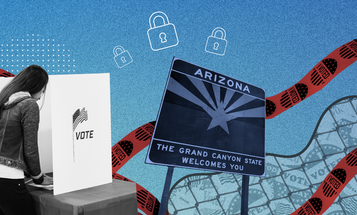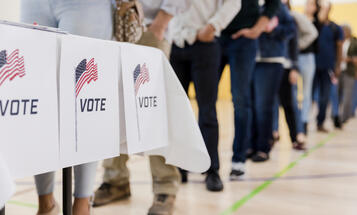
Federal Court Strikes Down Ohio Voter Purge: Purge of Irregular Voters Violates National Voter Registration Act
Today, a three-judge panel of the U.S. Court of Appeals for the Sixth Circuit struck down Ohio’s controversial purge of infrequent voters from its voter rolls. The decision reversed a lower court ruling in a lawsuit brought by public policy organization Demos and the American Civil Liberties Union of Ohio on behalf of the Ohio A. Philip Randolph Institute (APRI), the Northeast Ohio Coalition for the Homeless (NEOCH), and Ohio resident Larry Harmon. That lawsuit challenged the state’s practice of cancelling the registrations of Ohio voters who have not voted for a six year period.
The District Court must now ensure that Ohioans can go to the polls this November confident that the outcome will reflect the will of people.
On appeal, the Sixth Circuit found that this practice, known as the Supplemental Process, violates the National Voter Registration Act of 1993 (NVRA) by removing voters from the voter registration rolls merely because of their failure to vote. The NVRA, passed in 1993 to increase participation in the electoral process, requires states to maintain accurate and up-to-date voter rolls. The law allows states to remove a voter’s name from the rolls only if the voter has become ineligible, and it specifically prohibits states from removing voters for not voting. The case now goes back to the district court, which must fashion a remedy for voters impacted by the Supplemental Process.
“We are gratified by the Court’s recognition that voters do not become ineligible simply because they do not vote in every election,” said Stuart Naifeh, senior counsel at Demos and the attorney who argued the appeal for the plaintiffs. “Systematically preventing eligible Americans from exercising their right to vote, as Ohio has done, undermines public confidence in the integrity of the electoral process. The District Court must now ensure that Ohioans can go to the polls this November confident that the outcome will reflect the will of people.”
“Ohio’s purge of infrequent voters has disproportionately disenfranchised people of color,” said Andre Washington, president of APRI. “Now we can turn our attention to making sure every eligible Ohioan comes out to vote in November without having to worry about finding and re-registering voters who were unlawfully kicked off the rolls.”
In 2015, hundreds of thousands of Ohioans who had last voted in the 2008 Presidential Election were removed from the voter registration list, with over 40,000 purged in Cuyahoga County alone. In 2008, over 5.7 million people voted in Ohio—the most in any election in the state’s history.
Plaintiff Larry Harmon was one of the voters purged in 2015, but he did not learn he was off the rolls until he appeared at his polling place to vote last November. “I’ve been voting since 1976 and have lived in the same home for more than a decade, but when I went to vote, I was told that I wasn’t registered,” said Harmon explaining his experience during the November 2015 election. “It is my right to vote; staying home for a few years should not take that right away.”
“Would-be voters from around the state of Ohio only learned they had been purged when they got turned away from the polls,” said Freda Levenson, legal director for the ACLU of Ohio. “Today’s action by the Sixth Circuit will ensure we don’t hear more stories like Larry’s in future elections.”
According to today’s decision, states are prohibited from requiring voters to confirm their address or face being purged merely because they have not voted. Instead, states must obtain direct evidence that a voter has a new address, such a forwarding address on file with the Postal Service or a change of address submitted to a motor vehicle office.
“Going forward, this victory will allow Ohio’s homeless voters to remain on the voter rolls despite their inability to receive and respond to the state’s registration confirmation notices or get to the polls on a consistent basis,” said Brian Davis, the Executive Director at NEOCH. “This decision will help ensure that the voters NEOCH works with can have their voices heard.”
The Sixth Circuit decision continues a series of recent legal victories for groups challenging illegally burdensome voter suppression laws, including wins in North Carolina, Michigan, Kansas, Wisconsin, North Dakota and Texas.



